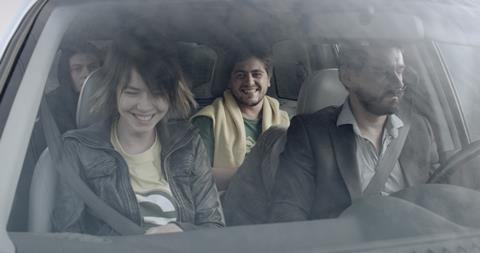Dir/scr. Adrian Sitaru. Romania, Poland, France, 2016. 86 min

Adrian Sitaru (Hooked, Best Intentions) brings the topic of abortion back into Romanian cinema, and even if the result is not quite as effective or disturbing as 4 Months, 3 Weeks and 2 Days, the Cannes 2007 winner, it is bound to shock quite a few sensitive minds and trigger passionate arguments about morality, incest and brotherly affection. This time without any historical perspective, for everything takes place in the present.
Though morality is obviously the main concern of the piece, Sitaru never attempts to preach
Written and performed almost like a stage play with a coda, Illegitimate moves smoothly from lighthearted insouciance to fierce explosions of anger and bitterness and then back again. Sitaru’s roving handheld camera chases the performers, and if the dark shadows of the past Ceausescu era are still here, the issues brought up are universal enough to draw worldwide attention from festival programmers at least.
The Anghelescu family seems, for all purposes, to be a happy one. The father, Victor (Adrian Titieni), is an obstetrician in his sixties and his four kids, Gilda (Cristina Olteanu), Cosma (Bogdan Albulescu), a physician, and the twins Sasha (Alina Grigore) and Romeo (Robi Urs) have just finished enjoying a meal together and are engaging in in the kind good-natured general arguments induced by full bellies. They all seem perfectly comfortable with each other, until one of the kids brings up the father’s record during the Communist regime. Is it true, as one of his friends told him, that Victor collaborated with the regime and used to inform on women who were attempting to terminate unwanted pregnancies?
The father not only confirms that the accusations were true, but refuses to be defensive about it. He insists the only reason for his conduct was purely moral - for he considered then and considers now that abortion is akin to murder.
The difference of opinions – for it is obvious that his children cannot go along with him - soon degenerates into pandemonium at the end of which Victor moves out of his own home. Centr stage is taken by the twins, Sasha and Romeo, who turn out to be passionately in love with each othere and if Sasha is tormented by guilt and would like to put an end to this unhappy affair, Romeo refuses to give her up, claiming the imperative drive of nature means more than any social convention.
Sitaru may have some problems for a while clarifying the identity of the four siblings and the relations between them, but once he does, he steers his way quite convincingly from one crisis to another until he falls, at the end, into the pitfall of manipulating the climax before he can safely reach the coda carrying his personal message. A message, by the way, that may not overcome many of the reservations the public may raise in this case.
On the other hand, however, Sitaru’s dialogue works and he does a great job establishing moods and navigating between them with a sure hand. To keep the plot going, he piles one moral issue on top of the other - beginning with Victor implying his late wife considered aborting the twins and only thanks to him have they seen the light of day. To crown it all, Sasha discovers she is pregnant by her own brother, making abortion look like an imperative oeven in the eyes of those who abhor it.
With a minimal budget to work on, Sitaru shot the film in two weeks, almost entirely indoors and in one apartment but had the cast rehearse and build up their characters for a whole year before that. Alina Grigore’s perky, outspoken Sasha and Adrian Titieni’s exasperated Victor stand out but the rest are not far behind. As for the camera, the two cinematographers are asked to act like documentarists who have been invited on stage to shoot the play in action.
Though morality is obviously the main concern of the piece, Sitaru never attempts to preach, allowing each character sufficient margin to convincingly believe in his own truth. Whether the audience will identify or at least agree with any of them depends, to a great extent, on the personal prejudices of each and every viewer.
Production companies: Domestic Film, Bucharest, Film Produkcja, Warsaw, Damned Film, Paris
International sales: Versatile Film (sales@versatile-films.com)
Producers: Anamaria Antoci, Stanislaw Dziedzic, Klaudia Smieja, Yohann Cornu
Cinematography: Adrian Silisteanu, Alexandru Timosca
Editors: Mircea Olteanu, Theo Lichtenberger
Production design: Elena Manea
Sound: Ioan Filip
Cast: Alina Grigore, Robi Urs, Bogdan Albulescu, Adrian Titieni, Cristina Olteanu, Miruna Dumitrescu, Liviu Vizitiu, Mihaela Perianu, Adrian Iacov























